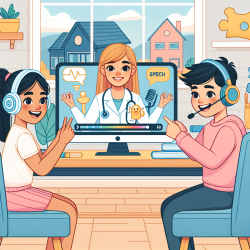In the field of special education, understanding the nuances of specific language impairment (SLI) is crucial for providing effective support to children. A recent study titled Temporal Processing Skills of Children with and without Specific Language Impairment by Simon Grondin and colleagues sheds light on how temporal processing deficits impact children with SLI. This blog will explore the key findings of this research and provide practical strategies for practitioners to enhance their skills in supporting children with SLI.
Understanding Temporal Processing Deficits in SLI
The study investigated the temporal processing abilities of children aged 6 to 9 years, comparing those with SLI to typically developing peers. The children were tested on two temporal-order judgment tasks (TOJ) and one interval-production task. The results indicated that children with SLI exhibited significant difficulties in determining the order of sensory signals and showed more variability in interval production tasks.
Key Findings
- Children with SLI had a weaker capacity to determine the order of arrival of sensory signals in both visual and bimodal TOJ tasks.
- Children with SLI showed greater variability and a higher coefficient of variation in the interval production task.
- Performance on the visual TOJ task was a strong predictor of group membership, with a 78% accuracy rate.
Practical Strategies for Practitioners
Given these findings, practitioners can implement several strategies to support children with SLI:
Enhancing Temporal Processing Skills
- Visual and Auditory Training: Incorporate exercises that require children to identify the order of visual and auditory stimuli. Gradually decrease the interval between stimuli to improve their temporal processing skills.
- Rhythmic Activities: Engage children in rhythmic activities such as clapping, tapping, or using musical instruments. These activities can help improve their ability to produce regular intervals and enhance their internal time-keeping processes.
- Multi-Sensory Approaches: Use multi-sensory teaching methods that combine visual, auditory, and tactile stimuli. This approach can help reinforce temporal processing skills across different sensory modalities.
Further Research and Professional Development
Encouraging further research and professional development is essential for practitioners to stay updated on the latest findings and techniques. Consider the following steps:
- Stay Informed: Regularly review recent studies and articles related to SLI and temporal processing. Join professional organizations and subscribe to relevant journals.
- Attend Workshops and Conferences: Participate in workshops and conferences that focus on SLI, temporal processing, and special education. Networking with other professionals can provide valuable insights and new strategies.
- Collaborate with Researchers: Establish connections with researchers in the field of speech-language pathology and special education. Collaborating on research projects can enhance your understanding and application of new findings.
By implementing these strategies and staying informed about ongoing research, practitioners can significantly improve their ability to support children with SLI. To read the original research paper, please follow this link: Temporal Processing Skills of Children with and without Specific Language Impairment.










